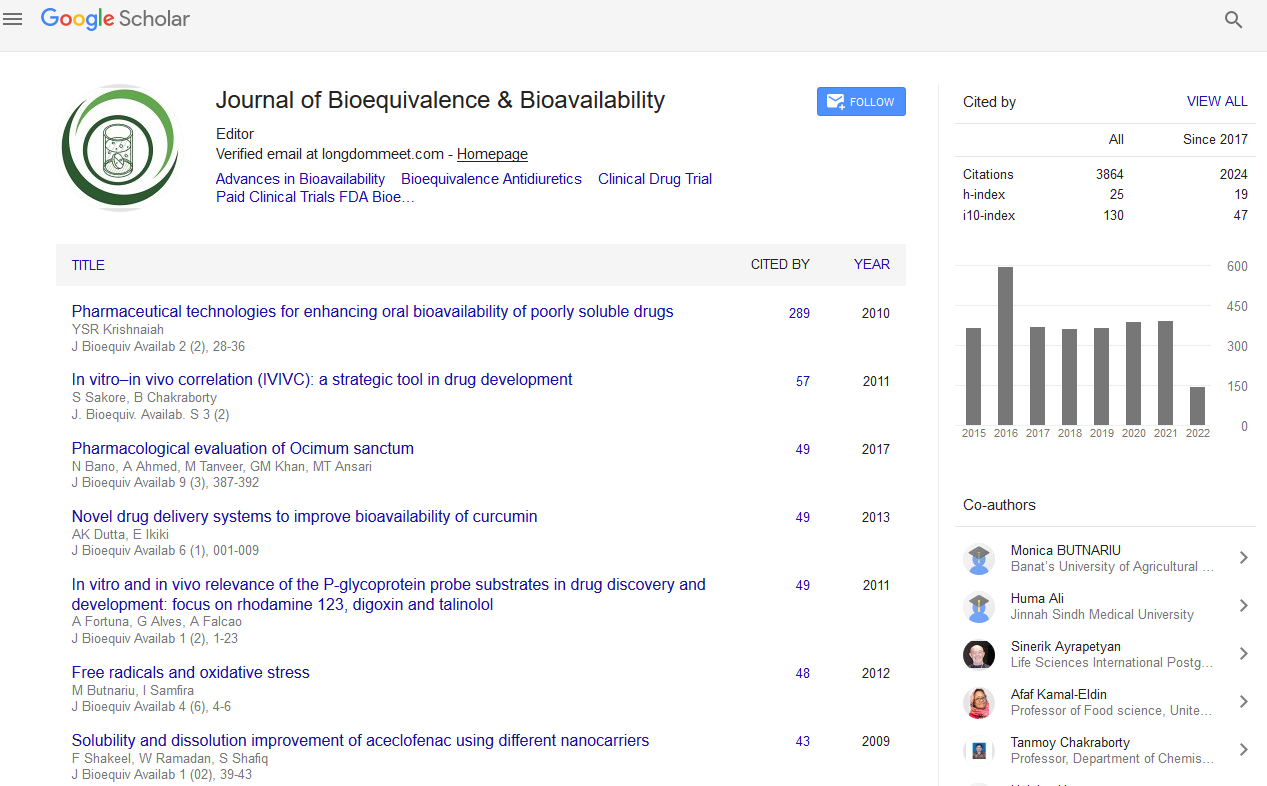PMC/PubMed Indexed Articles
Indexed In
- Academic Journals Database
- Open J Gate
- Genamics JournalSeek
- Academic Keys
- JournalTOCs
- China National Knowledge Infrastructure (CNKI)
- CiteFactor
- Scimago
- Ulrich's Periodicals Directory
- Electronic Journals Library
- RefSeek
- Hamdard University
- EBSCO A-Z
- OCLC- WorldCat
- SWB online catalog
- Virtual Library of Biology (vifabio)
- Publons
- MIAR
- University Grants Commission
- Geneva Foundation for Medical Education and Research
- Euro Pub
- Google Scholar
Useful Links
Share This Page
Journal Flyer

Open Access Journals
- Agri and Aquaculture
- Biochemistry
- Bioinformatics & Systems Biology
- Business & Management
- Chemistry
- Clinical Sciences
- Engineering
- Food & Nutrition
- General Science
- Genetics & Molecular Biology
- Immunology & Microbiology
- Medical Sciences
- Neuroscience & Psychology
- Nursing & Health Care
- Pharmaceutical Sciences
What hath FDA wrought: The February 2012 guidance and their implications for securing biosimilar approval
International Conference and Exhibition on Biowaivers & Biosimilars
September 10-12, 2012 Hilton San Antonio Airport, USA
Michael A. Swit
Accepted Abstracts: J Bioequiv Availab
Abstract:
Two years have passed since Congress, as part of the 2010 Health Care Reform legislation, enacted the Biologics Price Competition and Innovation Act (BPCIA), which created an abbreviated pathway for lower cost ?Biosimilar? versions of innovative biologic products that previously lacked a legal/regulatory mechanism for securing approval by FDA. While the pathway now exists, we still have not seen a single Biosimilar approval. Indeed, while FDA has said that a number of investigational new drug exemption (IND) filings have been made for Biosimilars, there has not been a report of the submission to FDA of a abbreviated application for a biosimilar. Explanations for the paucity of activity at FDA on Biosimilars focused on the lack of guidance from the agency. In fact, some ?generic? firms such as Teva announced that, in the absence of clarity on the pathway, they would prefer to file full biologics license applications rather than pursue the new Biosimilar route. FDA finally issued not one, but three, guidances in February 2012 that were intended to provide greater clarity. But, do the guidances raise more questions than they answer? This session will explore the guidances in detail and explain what they clarify and what the guidances leave unanswered for the Biosimilar applicant. In doing so, the session will focus on such key topics as: ♦ The scientific standards for securing Biosimilar approvals; ♦ Exclusivity for innovative products, ♦ The need for continuous interaction with FDA during the development process, ♦ The impact of user fee legislation on the Biosimilar process at FDA; ♦ Whether FDA will regard any Biosimilar as interchangeable for the innovator; and ♦ How FDA will be challenged by innovators who likely will raise scientific objections to FDA standards for approval using such techniques as FDA?s citizen petition process or even outright litigation.
Biography :
Michael Swit, Esq., brings a unique expertise and experience to the discussion of Biosimilars. Mr. Swit has been providing legal and regulatory professional services to pharmaceutical companies since 1984, the year Congress enacted the Drug Price Competition and Patent Term Restoration Act (commonly called the Hatch-Waxman Act). Indeed, the overwhelming focus of his early practice was representing generic drug companies struggling to deal with the implementation of Hatch-Waxman, including serving for 3.5 years as General Counsel of Par Pharmaceutical, a major generic drug firm. While at Par, he spearheaded Par?s successful response to multiple federal and state criminal and civil investigations arising out of the actions of prior management. Mr. Swit then served for over four years as CEO of FDAnews.com, a premier publisher of FDA regulatory newsletters and other specialty information products for the FDA-regulated community. While at FDA news, he edited the treatise, Getting Your Generic Drug Approved, and also brokered the company?s acquisition of Generic Line, the seminal specialty newsletter focusing on the generic drug industry. Mr. Swit also co-developed and co-directed the first intensive course on the generic drug approval process, which has been given almost annually since 1989, and has spoken and written on generic drug and biosimilar issues on many other occasions. Now practicing FDA Law in the San Diego office of Duane Morris LLP, an international law firm based in Philadelphia, Mr. Swit?s FDA regulatory law practice also has included service in the FDA Law Practice Group in the San Diego office of Heller Ehrman White & McAuliffe and with the Food & Drug Law practice at McKenna & Cuneo, both in the firm?s Washington office and later in San Diego. He first practiced FDA regulatory law with the D.C. office of Burditt Bowles & Radzius. Mr. Swit has taught and written on a wide variety of subjects relating to FDA law, regulation and related commercial activities and is a former member of the Food & Drug Law Journal Editorial Board. Mr. Swit also has been a prominent speaker at numerous conferences sponsored by such organizations as RAPS, FDLI, and DIA. A magna cum laude graduate of Bowdoin College, with high honors in history, Mr. Swit received his law degree from Emory University School of Law. He is a member of the California Bar.


